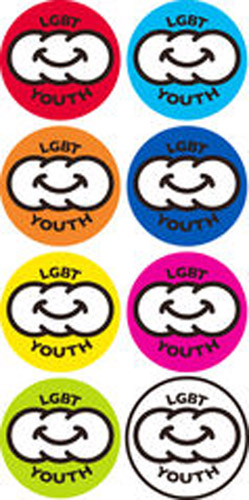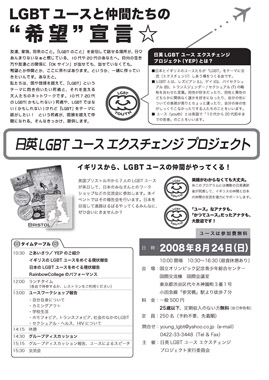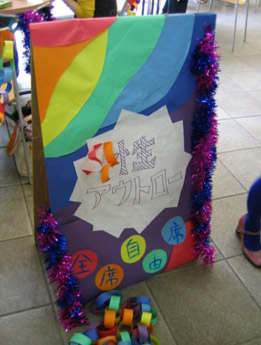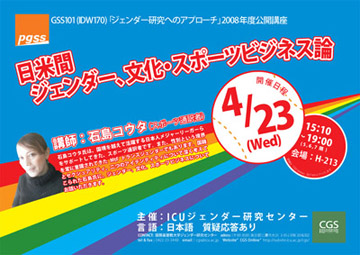Yuko INOUE
Co-ordinator for Japan, Japan-UK LGBT Youth Exchange Project
ICU Center for Gender Studies
【The article below is the same as the article that appears in the tenth issue of the CGS Newsletter.】
 The situation for LGBTs has seen great change in the last five years. In the UK, legislation has been passed to prevent discrimination based on sexual orientation and same-sex couples have been granted similar legal rights to those of heterosexual married couples. In Japan, an assembly member has publicly come out as a lesbian and there are many LGBT groups which are becoming more and more active.
The situation for LGBTs has seen great change in the last five years. In the UK, legislation has been passed to prevent discrimination based on sexual orientation and same-sex couples have been granted similar legal rights to those of heterosexual married couples. In Japan, an assembly member has publicly come out as a lesbian and there are many LGBT groups which are becoming more and more active.
Yet, are questioning LGBT youth finding it easier to access information or meet people to help them understand their sexuality? The answer is no. In fact, they are more liable to be exposed to negative information concerning homosexuality or the transgression of gender norms, so it is still difficult for them to accept themselves as they are. This kind of negative information and the lack of support for LGBT youth in education is becoming the largest hotbed for bullying due to homophobia and transgender abhorrence. In both Japan and the UK, many LGBT youth are the victims of bullying, and some are pushed to the point of contemplating or actually attempting suicide. At the same time, there are many LGBT youth who are struggling in their respective ways and situations to overcome these difficulties and transform the prejudice into understanding. In the movement to create a society that protects the rights of not only LGBT but people we cannot ignore the infinite possibilities that this type of initiative holds.
 When it is hard enough to meet other LGBT young people in our own countries, why do we cross over borders trying to meet others who live thousands of miles away? Paradoxically this is the very reason why we are holding this LGBT youth exchange. The exchange creates a space for young people and all involved to find themselves as well as each other in societies where heteronormativity and gender stereotyping attempt to wipe out and disadvantage the existence of any nonconformist. Additionally, being young makes LGBT youth a minority in LGBT communities. While coming-out is still a big issue for most LGBTs, it is even harder for young people to do so when their lives are dependent on parental care. This is still the case, not only in Japan, but also in the UK.
When it is hard enough to meet other LGBT young people in our own countries, why do we cross over borders trying to meet others who live thousands of miles away? Paradoxically this is the very reason why we are holding this LGBT youth exchange. The exchange creates a space for young people and all involved to find themselves as well as each other in societies where heteronormativity and gender stereotyping attempt to wipe out and disadvantage the existence of any nonconformist. Additionally, being young makes LGBT youth a minority in LGBT communities. While coming-out is still a big issue for most LGBTs, it is even harder for young people to do so when their lives are dependent on parental care. This is still the case, not only in Japan, but also in the UK. When I was a high school student in Japan, I was a closeted gay. I don’t think I even had that word - gay - to identify myself as. I knew the word “homo” and only revealed my sexuality in online forums. I had no idea how my friends and parents would respond if I came out because I had never seen anyone come out. I was comfortable with my sexuality but it was not until I left the country that I could tell my mother and my best friend that I was sexually/romantically attracted to men rather than women. I sometimes wonder, if I had not moved to New Zealand at the age of seventeen, would I have ever been able to come out? In a high school in Japan? I don’t think so.
When I was a high school student in Japan, I was a closeted gay. I don’t think I even had that word - gay - to identify myself as. I knew the word “homo” and only revealed my sexuality in online forums. I had no idea how my friends and parents would respond if I came out because I had never seen anyone come out. I was comfortable with my sexuality but it was not until I left the country that I could tell my mother and my best friend that I was sexually/romantically attracted to men rather than women. I sometimes wonder, if I had not moved to New Zealand at the age of seventeen, would I have ever been able to come out? In a high school in Japan? I don’t think so. “Gender, Culture and Sports Business in the U.S. and Japan” was a special lecture hosted by CGS as part of the “Approaches to Gender Studies” course at ICU on April 28, 2008. The guest speaker was Ms. Kota Ishijima, an MtF (male-to-female) transgender who has been working as a sports interpreter in support of Japanese Major League Baseball players in Japan and the US. She covered a wide range of topics, such as surviving sexual violence, marriage and children, coming out of the closet, and Japanese/American sports marketing. The lecture was based on Ishijima’s own life experience as an individual who has always been acutely aware of differences between men and women, and between Japanese and American cultures.
“Gender, Culture and Sports Business in the U.S. and Japan” was a special lecture hosted by CGS as part of the “Approaches to Gender Studies” course at ICU on April 28, 2008. The guest speaker was Ms. Kota Ishijima, an MtF (male-to-female) transgender who has been working as a sports interpreter in support of Japanese Major League Baseball players in Japan and the US. She covered a wide range of topics, such as surviving sexual violence, marriage and children, coming out of the closet, and Japanese/American sports marketing. The lecture was based on Ishijima’s own life experience as an individual who has always been acutely aware of differences between men and women, and between Japanese and American cultures.